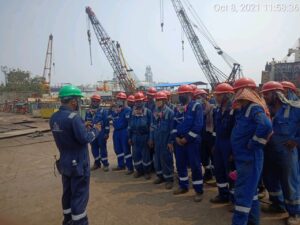- Leading ship recycling company and has been established in 1983
Challenges and Opportunities in the Shipbreaking Industry
The shipbreaking industry is responsible for dismantling end-of-life vessels which if left unchecked can pose a serious threat to the environment. The revenue generated from selling metal scrap and other useful materials recovered from the ships also boosts the economy and generates employment. The average number of large ships being scrapped each year is about 500-700, but taking into account vessels of all sizes this number may be as high as 3,000. With such large figures, ship recycling causes pollution and pose a threat to human and wildlife. Read this blog to know the challenges and opportunities in the shipbreaking industry.
Ships sent for recycling have large amounts of carcinogens and toxic substances (PCBs, PVCs, PAHs, TBT, mercury, lead, isocyanates, and sulfuric acid). These toxic substances are extremely harmful to the workers in the shipyard and the soil it is dumped in. Besides, the challenges the shipbreaking industry also generates a lot of opportunities. In this blog curated by R.L. Kalthia, you can explore various challenges and opportunities in the shipbreaking industry.

Addressing the Challenges in the Shipbreaking Industry
The ship recycling industry is struggling with significant challenges that encompass environmental, safety, and regulatory aspects. The challenges have compelled the shipbreaking industry to adopt responsible and sustainable shipbreaking practices. The challenges currently faced by the shipbreaking industry are elaborated below:
Occupational Health and Safety Challenges – Shipbreaking is labor intensive industry that includes cutting through metal structures, handling heavy equipment, and dealing with toxic substances. All these activities expose the workers in the yard to various health risks. The lack of proper safety regulations, inadequate training, and limited protective measures put workers at high risk of accidents, injuries, and even fatalities.
Environmental Challenges – During ship recycling many hazardous chemicals are released from the ships such as asbestos, lead, PCBs (polychlorinated biphenyls), and oil residues. These hazardous substances are a serious threat to the environment and contaminate soil, water bodies, and the surrounding ecosystem, leading to long-term ecological damage.
Regulatory and Legal Challenges – Several international bodies have been established to confront the legal and regulatory challenges of the shipbreaking industry. International regulations such as Basel Convention and the Hong Kong Convention work with the objective to address environmental and safety concerns. However, the implementation of the regulations imposed by these international organizations still remains an issue.
Enormous Opportunities in the Shipbreaking Industry
The shipbreaking industry generates economic opportunities, and technological advancement and fosters sustainable practices. Ship recycling is a labor-intensive industry that helps to generate employment opportunities for the locals and other people involved. The metal scrap recovered from ship recycling has a thriving market.
The ship recycling industry is estimated to be worth over $10 billion per year, and it is expected to grow in the coming years as the global fleet of ships continues to age. The opportunities offered by the shipbreaking industry are summarized below:
- The shipbreaking industry is constantly evolving with the development of new technologies. The new technologies are developed with the objective to generate more employment and enhance the safety of the workers.
- Ships that arrive for recycling are built with valuable materials such as steel, copper, aluminum, and plastics. The material is sold at a profitable price and attracts customers from all around the world.
- The shipbreaking industry employs millions of people generating tremendous employment opportunities. These job opportunities are highly beneficial in the developing industry where a large portion of the population is uneducated and unskilled.
Future Outlook of the Ship Recycling Industry
As the number of end-of-life ships is increasing worldwide, the demand for the shipbreaking industry is also increasing. There is an increasing need for safe and efficient dismantling of ships. There has also been an increased focus on sustainable and environment-friendly ship recycling activities. The future trends in ship recycling will prioritize environmentally friendly ship recycling methods, comprising the safe handling and disposal of hazardous materials, as well as the promotion of circular economy principles. The future trends in the shipbreaking industry encompass:
- Regulatory reforms at both the national and international levels.
- Innovation in waste management and automation
- Promotion of green ship recycling at the global level
- Increased focus on worker safety and welfare
- Growing emphasis on the sustainable practices
Conclusion
The shipbreaking industry can overcome its challenges by addressing challenges, implementing sustainable practices, and complying with regulations. The industry has the potential to evolve into a safer, more environmentally responsible, and economically viable sector. This can only be achieved by shipowners, shipbreaking yards, governments, international organizations, and environmental and labor advocacy groups working collaboratively.